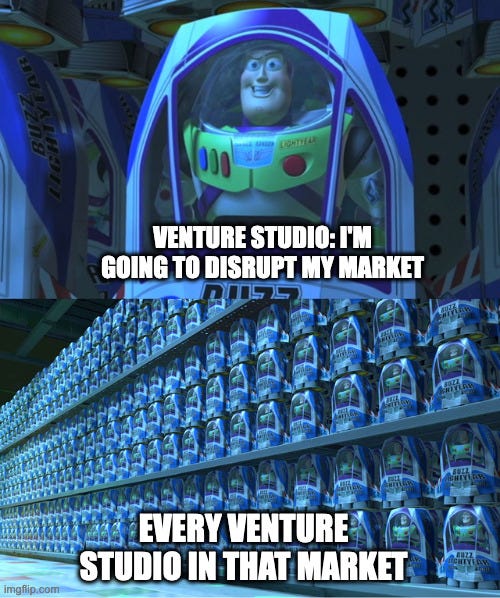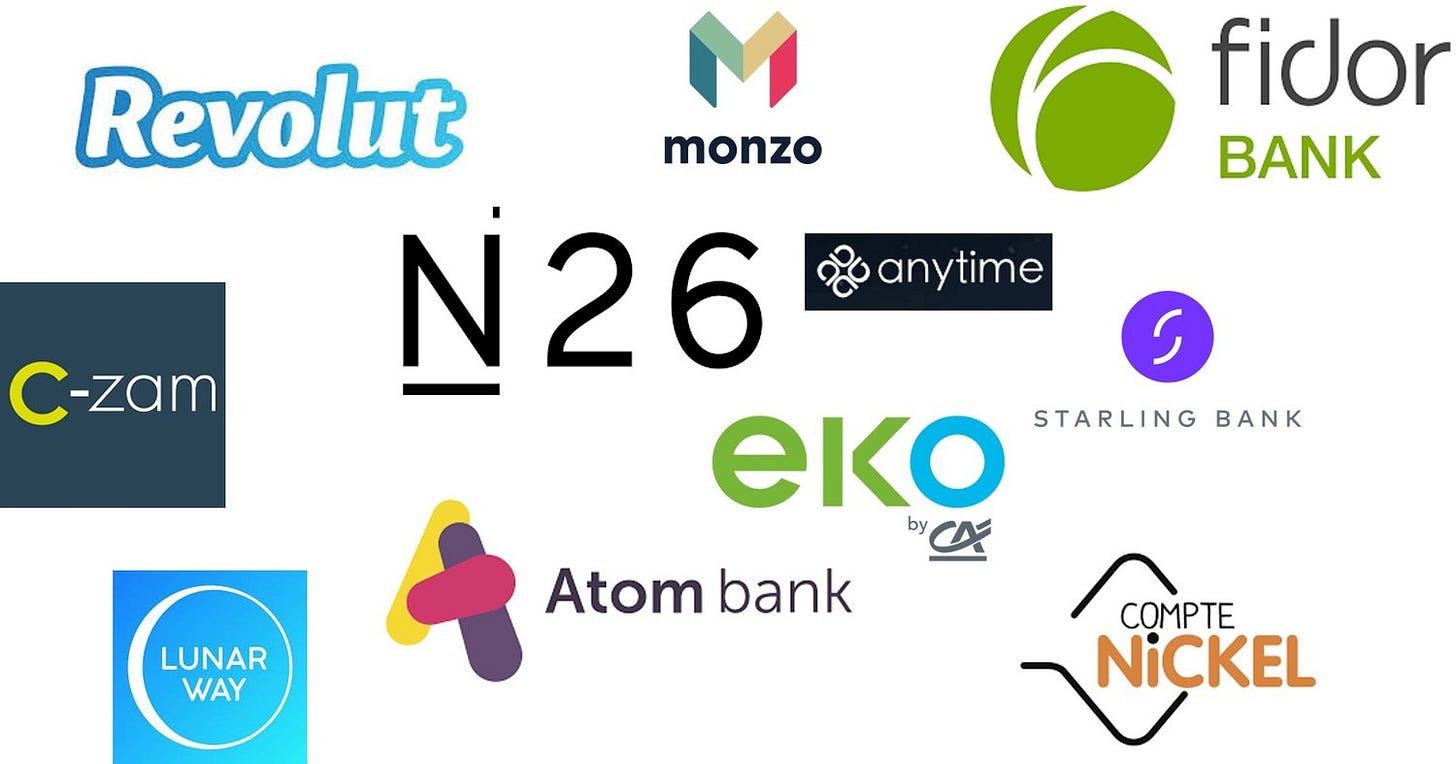Corporate venture studios will not disrupt anything
Saturated markets allow incremental innovations at best
Before I worked with startups, I worked as an innovation consultant. Doing this, I met dozens of C-suite people and corporate managers who shared a desire to innovate.
Most worked in saturated markets: banks, insurance companies, pension funds, and ICT infrastructure companies.
Innovation for the sake of innovation
They all expressed the desire to innovate, countless times. Their ambitions ranged from "We want to be more innovative" to “Let’s disrupt1 ourselves before someone else does it.”
It was unclear to me what kind of innovations they meant. I asked them to name three innovations by competitors which made them jealous.
90% couldn’t answer. They could only list whatever Apple, Boston Robotics, Tesla, or Meta was doing at the time
Often, these people just wanted a cool prototype to impress their colleagues with. Innovation should be about solving problems, but that message didn’t land with everyone.
Corporate venture studios
But those who were more serious about innovation created corporate venture studios, today a popular setup aimed at fostering innovation.
In many office buildings of large companies, we find a department with bean bags and a ping-pong table—a 2009 startup caricature. Within this department, multiple startups are run by corporate-paid employees who try to act like founders to explore new propositions.

These startups must run by strict milestones, such as market size assessment or key metrics early in the process. This is assessed by an innovation board in a stage-gate-like model.
Due to this guardrailed process, employees of corporate venture studios tend to sacredly latch on to startup methods such as the Lean Startup.
It seems a great way to attract younger personnel, a key challenge for most incumbents. Most people I’ve seen work here are younger than 35. But is it a great way to innovate and disrupt your field?
Everyone is trying the same ideas
An innovation manager at one recently said: "I spoke to a venture studio of a competitor, they are mostly doing the same ideas".
Then he listed a few ideas, some of which sounded familiar. I've seen ideas like that at venture studios of related industries. It confirmed something which I felt before: it's very hard to innovate in very saturated markets.
Innovating in a saturated market is hard
Consider a very saturated market: banks. In terms of value proposition to the consumer, they are more or less done with innovating. The concept of a bank is older than some religions. And frankly, it hasn't changed much, has it?

Most banks take your money, store it, and you get some interest. Get a loan? You pay interest. The core concept hasn't changed in four millennia.
The innovation department might have created a cooler UI for checking your loan potential, but that's about it.
You can support this newsletter. Click the button to learn more.
Rarely disruptive
I'm not saying there is no room for incremental innovation at these companies. But disruption, as in either truly new markets unlocked or rendering the old inferior? I doubt it.
Whatever claims you can make about the neobanks, beyond UI advances that the big players have caught up with by now: what is truly novel here?
Sure, you can add crypto to your wallet. But has that disrupted the banking industry? Not really; blockchain hasn’t lived up to its hyped promises to begin with.
A friend of mine, who works at a corporate venture studio of a bank, said that regulations are not helping here to move fast and try new things. I wonder what banking innovations are not being done due to regulations.
One ironic example
The only example that some innovation-needy CEOs could list was Tikkie, created by the big bank ABN Amro.
It’s a payment request app in The Netherlands. This country didn't have any payment request app yet (such as Venmo), so there was space to disrupt, or at least create a market.
But, most ironically, this app didn't originate from a venture studio. It was created in a digital UI department, someone at ABN Amro once told me. Successful? Yes and no.
In 2023, the app transferred over 6 billion euros, showing huge adoption. Yet, this person also told me that the monetization of Tikkie as far as I heard is a struggle, despite many attempts. While the product has many users, the direct revenue streams are lacking.
Incremental and off the shelve innovation
Disruption is hard, especially for corporates. I've yet to see examples of truly novel value propositions and products being developed that are not a mild variation of what the big corporation already was offering.
A key issue might be that they are not spending enough on R&D to develop truly novel technologies that allow them to address new problems and jobs to be done. As corporate R&D has had less succes, we shouldn’t be surprised that fewer new technologies emerge.
As a result, I see a lot of venture studios applying off-the-shelf ‘innovations’ to their parent’s company offering, e.g. adding ChatGPT. This is unlikely to be disruptive.
Summarising, these venture studios might create incremental innovations for specific niches, making things more efficient. But, I’m not convinced that corporate venture studios will achieve disruptive innovation.
Disruption comes with many definitions, like many terms in this field. This scientific article sums up some definitions. Should I do a post on the ideas of disruption? Let me know in the comments.









Again a good piece by Jeroen. When looking solely from the purpose of corporate innovation with a goal of actually creating something he is spot on. However there might be other reasons to do corporate innovation studios. Such as talent development, culture improvement, fostering creativity..... So whilst usually the outcome of these departments is not overly cool and disruptive it might serve other purposes as well making it sometimes a relevant thing that will fail but failure is part of the plan....
I do not entirely agree with this one. I work with many corporate ventures and innovation studios; some run outstanding research and employ great people. I was surprised to learn that Nokia has excellent research, P&G and Nestle have some extraordinary ventures and there are many more examples that I cannot just name drop. Moreover, acquisitions can be a powerful lever. I am not saying that all corporate innovation is impressive, but the resources there are great.